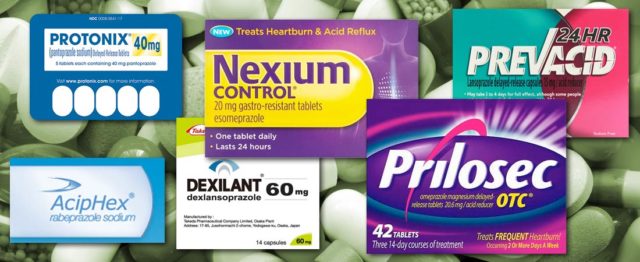COVID-19 Warning! Malaysian Led Research Shows That Gastric Reflux Drugs (PPIs ) Linked To Increased Risk of Severe or Fatal COVID-19 Outcome
Source: COVID-19 Warning Nov 06, 2020 4 years, 5 months, 2 weeks, 18 hours, 42 minutes ago
COVID-19 Warning: Malaysian researchers Dr Chia Siang Kow from the International Medical University, in Kuala Lumpur-Malaysia and Dr Syed Shahzad Hasan from the University of Huddersfield-U.K have in a new meta-analysis study involving 5 past research data involving a total of 37,372 patients found that proton-pump inhibitors (PPIs) usage is associated with an increased risk for poor outcomes in patients with COVID-19.

Most of the proton-pump inhibitors (PPIs) mentioned in the studies included omeprazole, esomeprazole, rabeprazole, lansoprazole, pantoprazole, dexlansoprazole etc
The study findings were published in the peer reviewed Journal of Internal Medicine.
https://onlinelibrary.wiley.com/doi/full/10.1111/joim.13183
The study team that there were motivated by a previous study which reported that patients with COVID‐19 receiving proton pump inhibitors (PPIs) were at increased risk for the development of secondary infection and acute respiratory distress syndrome.
https://pubmed.ncbi.nlm.nih.gov/32608546/
The use of PPIs understandably may lead to excessive suppression of gastric acid, and thus leading to impaired eradication of ingested pathogens, which results in the increased risk of secondary infection reported in the study.
It was reported however that the association between the use of PPIs and adverse clinical outcomes such as acute respiratory syndrome in patients with COVID‐19 is not expected, since previous in vitro study has demonstrated the ability for PPIs to inhibit the production of pro‐inflammatory cytokines, which is suggestive of their potential to dampen cytokine storm associated with COVID‐19.
https://pubmed.ncbi.nlm.nih.gov/27441656/
As there have been few studies addressing the same issue, the study team aimed to perform a meta‐analysis to summarize the overall effect of PPI on the COVID‐19 associated adverse clinical outcomes.
An initial pooled analysis of three studies demonstrated a significantly increased likelihood for a severe or fatal course of COVID-19 with PPI use relative to nonuse (pooled odds ratio, 1.46; 95% confidence interval, 1.34 to 1.60).
https://www.medrxiv.org/content/10.1101/2020.07.23.20160747v1
https://www.medrxiv.org/content/10.1101/2020.07.12.20151084v1
https://gut.bmj.com/content/gutjnl/early/2020/07/30/gutjnl-2020-322248.full.pdf
A further pooled analysis of two other studies also showed significantly increased odds for secondary infections with the use of PPIs in COVID-19 patients (pooled OR, 2.91; 95% CI, 1.58 to 5.36).
https://pubmed.ncbi.nlm.nih.gov/32608546/
ps://www.researchsquare.com/article/rs-55958/v1">https://www.researchsquare.com/article/rs-55958/v1
Corresponding author Dr Chia Siang Kow told Thailand Medical News, "The use of PPIs may lead to excessive suppression of gastric acid, and thus leading to impaired eradication of ingested pathogens, which results in the increased risk of secondary infection in patients with COVID-19.”
He added, "The observed increased risk of severe or fatal course of illness with the use of PPIs may also be at least partially due to the development of secondary infections, leading to a more complicated course of illness.”
Both Dr Chia Siang Kow and Dr Syed Shahzad Hasan jointly advised physicians, "Clinicians involved in the management of patients with COVID-19 receiving PPIs should routinely assess if PPI is appropriately indicated; if no appropriate indication, PPI should be discontinued. In patients with appropriate indications, the risk of continuing PPI should be balanced against the risk of discontinuation; otherwise, patients may also be switched to famotidine, a histamine-2 blocker, which has been associated with reduced risk of adverse outcomes in patients with COVID-19."
https://www.thailandmedical.news/news/breaking-covid-19-treatments-second-observational-study-shows-famotidine-associated-with-better-outcomes-for-hospitalized-covid-19-patients
https://www.thailandmedical.news/news/breaking-studies-show-famotidine,-a-common-indigestion-drug-could-help-in-mild-to-moderate-cases-of-covid-19
https://www.thailandmedical.news/news/covid-19-treatments-study-shows-using-dual-antihistamines-such-as-cetirizine-and-famotidine-helps-pulmonary-symptoms-in-covid-19-patients
Numerous other medical professionals also commented that consistently, multinational studies are showing an association, not necessarily causation, but an association between PPI use and COVID-19.
https://www.thailandmedical.news/news/breaking-news-covid-19-alert-research-led-by-cedars-sinai-indicates-that-proton-pump-inhibitors-ppis-use-is-linked-to-increased-risk-of-covid-19
Some said, "This isn't necessarily surprising as these medicines have been linked to increased risk of intestinal infections. That's been shown many times and there's really no controversy about that anymore and COVID is an intestinal infection. It uses the GI tract to gain a foothold in the body and anything that we do to give it better access to the intestinal system, it makes sense that things could get worse and that's basically what we're seeing."
Significantly the results of this meta-analysis are consistent with a recent study by Professor Dr Brennan MR Spiegel and colleagues from Cedars-Sinai Medical Center-California. In that study, people taking a PPI once a day had more than a two-fold higher risk of COVID-19, and people taking a PPI twice a day had more than a three-fold higher risk than those not taking a PPI.
https://journals.lww.com/ajg/Documents/AJG-20-1811_R1(PUBLISH%20AS%20WEBPART).pdf
Dr Spiegel added, "As a starting point, we might need to start thinking about reducing the high doses of PPIs that some people are on, particularly those who are at risk of a bad COVID outcome."
The Malaysian researchers concluded, “However, since the increased risk for a severe or fatal course of COVID‐19 was small as observed in the effect size of our pooled analysis, the decision to discontinue PPIs in COVID‐19 patients should be based on an individual risk‐benefit assessment. Nevertheless, our study findings again serve as a reminder for clinicians to regularly review the continuing need for acid suppression in every patient with PPI use. Since the studies included are of retrospective design with limited heterogeneity, more prospective studies are required to substantiate our findings.”
For more
COVID-19 Warnings, keep on logging to Thailand Medical News.
